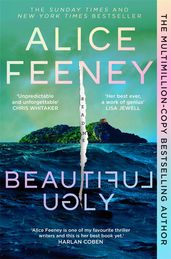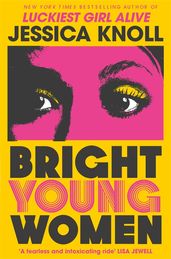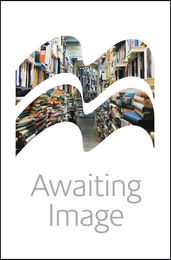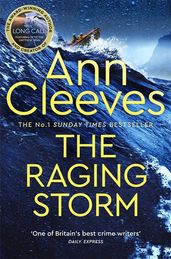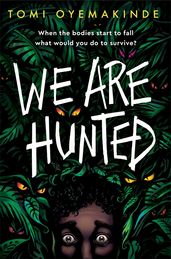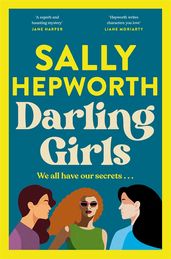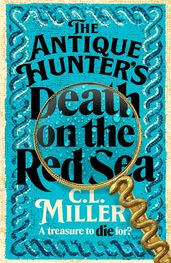Unmissable new thriller books of 2026, vouched for by the experts
A must-read edit of the best new thriller books coming this year, alongside brilliant reads from 2025, with recommendations from some of the world's bestselling authors in the genre.
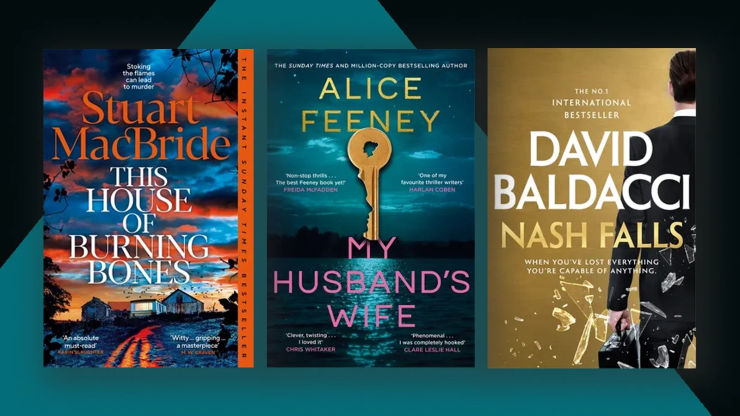
If, like us, you’re always searching for a thriller book you won't be able to put down, you're in the right place. In this expert guide we share the best new thrillers publishing in 2026 alongside brilliant reads from 2025, as recommended by the true experts: fellow crime and thriller authors. From psychological page-turners to domestic thrillers with twists you’ll never see coming, read on for the most anticipated new thriller releases this year.
Mind games & unreliable narrators: the best new psychological thrillers
If you love deep character studies, internal conflict, and twists you won't see coming, these reads are for you.
My Husband's Wife
by Alice Feeney
Why read this: This new novel from bestselling author Alice Feeney is a dark, clever read built around the ultimate domestic deception. Artist Eden Fox returns to her new home, Spyglass, from a run, to find her key doesn’t fit, and a woman who looks eerily like her answering the door. Worse, her husband insists this stranger is his wife. . .
If you’re looking for: Marriage thriller, coastal setting, doppelgängers, obsession, dual timelines.
Great for fans of: None of this is True by Lisa Jewell, The Guilty Couple by C.L. Taylor, The Wrong Sister by Claire Douglas.
What the experts think: ‘My Husband’s Wife is propulsive, compulsive, addictive and everything else you could possibly want a psychological thriller to be. I read it in under a day, breathlessly, with wide eyes’ – Lisa Jewell. ‘The best Feeney book yet!’ – Freida McFadden, author of The Housemaid.
Unreliable Narrator
by Araminta Hall
Why read this: This razor-sharp, creepy thriller will leave you constantly questioning what is real, as a woman discovers her life has been depicted in the pages of a bestselling novel. Ten years ago, ambitious and driven Hope landed a job with bohemian author Ambrose Glencourt, which ended in a fatal disaster. Hope has worked hard to keep the secret of those events ever since. But now, Ambrose has written a novel based on the story which paints a rather different version of events from what Hope remembers. Which one of them is the reliable narrator? This new novel from Araminta Hall is sure to be huge in 2026.
If you’re looking for: Books about books, feminist thriller, dark secrets, toxic relationships, revenge.
Great for fans of: Alice Feeney, Lisa Jewell.
What the experts think: 'Clever, sharp, and simmers with a perfectly contained rage' – Sarah Vaughan, author of Anatomy of a Scandal. ‘One of the most daring and intriguing writers working today’ – Gillian Flynn, author of Gone Girl.
Beautiful Ugly
by Alice Feeney
Why read this: Instant Sunday Times bestseller Beautiful Ugly is a gripping and deliciously dark new thriller about marriage, and revenge. When Grady Green finds his wife’s car by a cliff edge, the headlights are on, the driver door is open, her phone is still there . . . but she is nowhere to be seen. A year later, still in the depths of grief and on a trip to a remote island in search of a fresh start, he sees the impossible: a woman who looks exactly like his missing wife. Prepare for a tense, atmospheric read with a chilling twist.
If you’re looking for: A dark thriller, psychological suspense, revenge, unreliable narrator, atmospheric thriller, missing person mystery, remote setting suspense, identity thriller.
Great for fans of: Lisa Jewell's None of This Is True, C.L. Taylor's The Guilty Couple, Claire Douglas's The Wrong Sister.
What the experts think: 'I was consumed by this book, it's her best ever, a work of genius' – Lisa Jewell, author of None of This is True. ‘Her best book yet’ – Harlan Coben.
Deadline
by Steph McGovern
Why read this: Her earpiece has been hacked. She’s live on air in the middle of the interview. They tell her they have kidnapped her family. In Deadline, the new debut thriller from award-winning broadcaster and journalist Steph McGovern, a high-stakes, nightmare scenario turns a TV reporter's dream opportunity into a terrifying hostage situation. This must-read thriller masterfully builds suspense to keep you on the edge of your seat.
If you’re looking for: A high-concept thriller, real-time suspense, psychological duress, forced choices.
Great for fans of: Harlan Coben's I Will Find You, Kill For Me Kill For You by Steve Cavanagh.
What the experts think: ‘A pacy, witty, engaging thriller, entertaining and delightfully authentic, but hard-hitting and thought-provoking too. I can't wait for you all to read it.’ ー Ann Cleeves, author of the bestselling Vera Stanhope and Shetland crime series
One of the Good Guys
by Araminta Hall
Why read this: One of the Good Guys is a chilling and timely exploration of presumed innocence and hidden darkness. When two young women vanish, a seemingly 'perfect husband' and his reclusive artist neighbor become entangled in a police investigation, revealing that people are rarely who they seem. A must-read for fans of psychological thrillers, One of the Good Guys explores gendered violence and what happens when women have had enough . . .
If you're looking for: Hidden darkness, community secrets, psychological manipulation.
Great for fans of: Gillian Flynn, Sarah Vaughan.
What the experts think: 'Razor-sharp, spine-tinglingly convincing and unputdownable' – Lisa Jewell, author of None of This is True. 'One of the most daring and intriguing writers working today.' – Gillian Flynn, author of Gone Girl.
‘ ‘Every single woman out there needs to read this, because you either know this man, or you know a woman who knows this man.’’
The Good Wife
by Jacqui Rose
Why read this: The Good Wife explores the dangerous secrets that lurk just beneath the surface. A psychologist's double life unravels when an attack on her father exposes hidden truths, forcing her into London's gritty underworld. Ideal for readers who enjoy dark, character-driven thrillers about hidden identities and family betrayals.
If you’re looking for: domestic suspense, family secrets, hidden identity, psychological unraveling, moral ambiguity.
Great for fans of: Martina Cole and Kimberley Chambers.
What the experts think: 'One of my favourite authors' – Mel Sherratt
Bright Young Women
by Jessica Knoll
Why read this: From Jessica Knoll, the New York Times bestselling author of Luckiest Girl Alive, Bright Young Women is a powerful and unsettling new thriller based on the heinous crimes of Ted Bundy. It follows two women, determined to find justice, who join forces as their search for answers leads to a final, shocking confrontation.
If you're looking for: feminist thriller, true crime inspired, serial killer thriller, female protagonists, resilience, suspense, twists.
What the experts think: 'Knoll deconstructs the myth of a criminal mastermind, revealing the women he seeks to destroy as the truly brilliant ones.' – Flynn Berry, author of Northern Spy.
The Girlfriend
by Michelle Frances
Why read this: While this book isn’t technically new (it first came out in 2017), it has just been adapted into an Amazon Prime TV series, making it worthy of a spot on your TBR if you missed it the first time around. Laura has it all. The career, a happy marriage, and a kind and handsome twenty-three year-old son, Daniel. Then Daniel meets Cherry, who hasn’t led Laura’s golden life . . . and she wants it. This chilling debut is the story of a mother, a son, his girlfriend and an unforgivable lie.
If you're looking for: psychological thriller, suspense, family dynamics, twisted relationships, secrets and lies.
Great for fans of: The Teacher by Frieda McFadden, Behind Closed Doors by B.A. Paris, The Lemon Grove by Helen Walsh.
What the experts think: ‘I was blown away. The Girlfriend is the most marvelous psychological thriller . . .I couldn’t put it down and kept sneaking upstairs to read another few pages . . . Please read this genuinely exciting novel.’ – Jilly Cooper, author of Rivals
The Sunshine Man
by Emma Stonex
Why read this: Following the success of The Lamplighters, Emma Stonex returns with a taut, emotionally charged thriller set in January 1989. Birdie has waited eighteen long years for this moment: the man who killed her sister is out of prison. With a gun in her bag and vengeance on her mind, she sets off for London. But as she closes in, secrets from the past begin to surface . . .
If you're looking for: 1980s thriller, historical crime, revenge plot, family secrets, emotionally charged, gripping, unreliable narrator, literary thriller.
Great for fans of: Emma Stonex’s The Lamplighters, Claire Fuller’s Unsettled Ground and Tana French’s The Hunter.
What the experts think: ‘A remarkable novel - heart-wrenching, unflinching and deeply compassionate . . . thrilling, and incredibly moving. If you loved The Lamplighters, I guarantee you’ll love The Sunshine Man too.’ ー Emylia Hall, author of The Shell House Detectives series
Gripping new crime & detective thrillers
For readers who love intricate investigations, professional detectives, and the hunt for justice. Expect compelling cases, police procedurals, and the darker side of human nature.
This House of Burning Bones
by Stuart MacBride
Why read this: This House of Burning Bones is the latest thriller from bestselling author Stuart MacBride, whose novels are hailed as ‘an automatic must-read’ by Lee Child. Detective Inspector Logan McRae is forced to manage a major murder investigation with a skeleton crew of misfits as the city of Aberdeen descends into chaos. A firebombing, a huge protest, and a hostile media mogul are all adding to the pressure, but things are about to get much, much worse . . .
If you're looking for: police procedural, Scottish crime fiction, detective series.
Great for fans of: Ian Rankin, Val McDermid.
What the experts think: 'Stuart MacBride is an automatic must-read for me . . . always fast, hard, authentic – and different' – Lee Child, author of the Jack Reacher series. 'MacBride is a damned fine writer' – Peter James, author of the Roy Grace Series.
The Cut Throat Trial
by The Secret Barrister
Why read this: The Cut Throat Trial is the first legal thriller from the million-copy bestselling Secret Barrister, writing as S. J. Fleet. From an author with incomparable insider’s knowledge, this page-turner follows a trial billed as the ‘biggest of the year’, as three seventeen-year-old boys are accused of the brutal murder of an elderly teacher on New Year's Eve. Each boy denies it. Each points the finger at the other two. But they can’t all be innocent.
If you're looking for: Twists you won’t see coming, legal thriller, courtroom drama.
Great for fans of: The Secret Barrister, Mick Herron’s The Secret Hours, Sarah Vaughan’s Anatomy of a Scandal, C. J. Tudor’s The Chalk Man.
What the experts think: 'Astute, empathetic, and satisfyingly twisty' ー Sarah Vaughan, author of Anatomy of a Scandal and Reputation
One of Us is Dead
by Peter James
Why read this: In the twentieth installment of the bestselling Grace series – now a major ITV show starring John Simm – DSI Roy Grace is back to investigate a number of suspicious deaths that he can’t get out of his mind, mainly because a man thought to be dead seems, somehow, to be connected to them all. Peter James consistently delivers pulse-pounding police procedurals that keep readers guessing until the very end. A must-read for fans of long-running, character-driven crime series.
If you're looking for: police procedural, Brighton crime, detective thriller, cold case mystery, suspenseful investigation, plot twists, major TV series.
What the experts think: 'One of the best British crime writers.' – Lee Child
The Dark Wives
by Ann Cleeves
Why read this: In the eleventh installment in the bestselling Vera Stanhope series, a body is found outside a care home for troubled teens and Vera’s only clue is the disappearance of fourteen-year-old resident, Chloe. Then, in the isolated countryside near the Three Dark Wives standing stones, a second body is found, and folklore and fact begin to collide. Ann Cleeves delivers another intricate mystery, blending sharp police work with the atmospheric setting of rural England.
If you're looking for: police procedural, British crime fiction, detective series, rural mystery, folklore.
Great for fans of: Val McDermid, Elly Griffiths and Mark Billingham.
What the experts think: 'A series of expertly plotted and mesmerizing crime novels.' – Mick Herron, bestselling author of Slow Horses
The Dead and the Dying
by Lin Anderson
Why read this: According to reviews, 'forensic scientist Rhona MacLeod has become one of the most satisfying characters in modern crime fiction'. The Dead and The Dying is the latest installment in this much-loved series. When Rhona MacLeod uncovers a human skeleton entombed in a stone crypt, the grave is believed to hail from the Viking Age, but Rhona’s analysis of the content points to more recent and sinister evil . . .
If you're looking for: Forensic science thriller, investigative thriller, Scottish setting.
Great for fans of: Ian Rankin and Martina Cole.
What the experts think: ‘Lin Anderson is one of Scotland’s national treasures . . . her writing is unique, bringing warmth and depth to even the seediest parts of Glasgow.’ – Stuart MacBride
The Raging Storm
by Ann Cleeves
Why read this: In the latest mystery in the Two Rivers series (now a major ITV series, The Long Call), Detective Matthew Venn investigates when the body of sailor and local celebrity, Jem Rosco, is found amidst a vicious storm in a remote coastal town. Cleeves masterfully weaves together local legends, community secrets, and a brutal crime. For readers who appreciate atmospheric crime novels where setting plays a key role. Expect fierce winds, howling seas and deadly secrets.
If you're looking for: coastal mystery, atmospheric crime, small-town secrets, detective series, stormy setting, major TV series.
Great for fans of: Elly Griffith’s The Locked Room, Val McDermid’s 1989, Peter James’ Picture You Dead.
What the experts think: 'Clever, compassionate and atmospheric' ー Elly Griffiths
Edge-of-your-seat action & high-stakes thrillers
These new reads are for those who love adrenaline-pumping plots, global conspiracies, and heroes in constant peril. Expect fast pacing, high body counts, and thrilling escapes.
Nash Falls
by David Baldacci
Why read this: This is the brand new series from internationally bestselling author David Baldacci. Meet Walter Nash, a successful businessman whose comfortable life is shattered when the FBI reveals the company he works for is a front for a criminal organisation. Asked to join a risky scheme to bring the whole thing to the ground, Nash is thrust into a high-stakes undercover mission which will force him to completely reinvent himself. This high-octane exploration of revenge and justice shows why Baldacci remains number one in the genre.
If you’re looking for: Undercover operations, everyman protagonist, criminal organisations, revenge mission, transformation, high-stakes justice.
Great for fans of: Lee Child’s Jack Reacher series, Michael Connelly.
What the experts think: ‘Baldacci is the master’ – Jeffrey Archer.
Underdogs
by Stephen Leather
Why read this: Stephen Leather, the Sunday Times bestselling author of the Spider Shepherd series, raises the bar with a distinctive new protagonist: Andy ‘Deadman’ Bird, a former SAS hero now battling the harsh streets of London after a catastrophic mission stripped him of his hearing, career, and marriage. When Andy witnesses a chilling alleyway murder, he becomes the next target for trained killers and corrupt police alike. Desperate and cornered, Andy reaches out to his former brothers-in-arms, a team who owe him their lives.
If you’re looking for: SAS skills, London underworld, organised crime, high-octane action.
Great for fans of: Lee Child and James Patterson.
White King
by Juan Gómez-Jurado
Why read this: The climax to the internationally bestselling Antonia Scott trilogy from Spain’s bestselling thriller writer (now a major TV series). With the Red Queen project under attack and agents turning on each other, Antonia's unique forensic mind is tested against a dangerous mastermind, Mr. White. A must-read for fans of international espionage, brilliant protagonists, and complex, high-stakes plots. If you’re new to the series, don’t miss the first installment, Red Queen.
If you're looking for: International thriller, espionage, forensic mind, secret agents, global conspiracy, major TV series.
Great for fans of: Steig Larsson’s The Girl with the Dragon Tattoo.
What the experts think: ‘Red Queen is one of the most extravagantly entertaining novels I’ve ever read. Sprinting from spectacular surprise to even-more-spectacular surprise; whirling from one crisply textured character to the next.’ A.J. Finn, bestselling author of The Woman in the Window.
Famous
by Blake Crouch
Why read this: If you're looking for a suspenseful thriller with a clever twist, Famous by bestselling author Blake Crouch is a must-read. It tells the story of Lance, a man who has been mistaken for the Oscar-winning movie star, James Jansen, twenty-eight times. After losing his job, Lance decides to pursue his dream of becoming his famous lookalike. Part comedy, part human tragedy, and part suspense, the world through the eyes of Lancelot Blue Dunkquist is like none you’ve ever seen . . .
If you're looking for: psychological thriller, books about obsession, darkly funny, unique premise, slow burn.
Great for fans of: Stephen King and Dean Koontz.
What the experts think: 'Blake Crouch has invented his own brand of page-turner – fearlessly genre-bending, consistently surprising, and determined to explode the boundaries of what a thriller can be' ー Karin Slaughter, author of Pretty Girls
One Wrong Turn
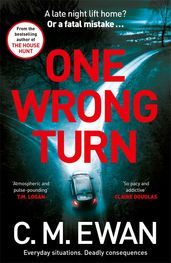
Why read this: A compelling and terrifying road trip gone wrong. When a couple make a wrong turn and stop to help a stranded family on a deserted road, they quickly realize their mistake and find themselves in unimaginable danger. A masterclass in building tension and dread in a confined, isolated setting.
If you're looking for: unexpected danger, psychological tension, isolated setting.
What the experts think: 'One Wrong Turn had me gripped from the off. It’s the kind of thriller you can’t put down, full of deftly executed twists and turns and so satisfying. Highly recommended!' – Jennie Godfrey, author of The List of Suspicious Things
We Are Hunted
by Tomi Oyemakinde
Why read this: A tense YA horror-thriller set on a top-secret island filled with futuristic technology and spectacular animals. Two brothers uncover horrific secrets on their father’s business trip, and when the island goes into lockdown they must decide who to trust with their lives and how far they will go to survive. Perfect for readers who enjoy high-concept horror thrillers with a strong sense of isolation and growing dread.
If you're looking for: Sci-fi thriller, horror thriller, isolated setting.
Great for fans of: Jeff VanderMeer’s Annihilation,You're Not Supposed to Die Tonight by Kalynn Bayron
What the experts think: ‘Full of twists and turns, a cast full of characters to root for, and so much heart, We Are Hunted is impossible to put down.’ ー Jamison Shea, author of I Feed Her to the Beast and the Beast is Me
Dark and twisty new domestic thrillers
Read on for thrillers that explore the dangers that lie close to home, exposing family secrets, marital deceptions, and hidden pasts that unravel relationships.
The Family Experiment
by John Marrs
Why read this: In this dark new dystopian thriller, as the world’s population is soaring and economic crisis unfolds, more and more people can no longer afford to start families. The story follows a reality TV series which offers people the chance to raise a virtual child from birth to the age of eighteen, in a condensed nine-month time period. The prize: the right to keep their virtual child – or risk it all for the chance of a real baby . . .
If you're looking for: High-concept, speculative thriller, dystopian thriller, social commentary, reality TV suspense, speculative fiction, ethical dilemmas.
What the experts think: 'John Marrs is not to be missed' – Freida McFadden, bestselling author of The Housemaid. 'Few writers do domestic suspense meets dystopia better than John Marrs' – Lucy Foley, bestselling author of The Hunting Party.
The Final Hours of Muriel Hinchcliffe
by Claire Parkin
Why read this: A compelling story of two toxic best friends, betrayal, and the echoes of the past. As Ruth cares for Murial while her health deteriorates, Murial makes the shocking announcement that she will die in exactly 72 hours. Over the days that follow, their shared history unravels, proving that even the closest bonds can hide dangerous secrets. Ideal for those who enjoy character-driven domestic thrillers with a focus on long-held secrets.
If you're looking for: friendship thriller, past secrets, character-driven suspense, hidden past.
Great for fans of: Joanna Cannon, Charlotte Levin and Jennie Godfrey.
What the experts think: ‘I couldn’t get enough of this beautifully written, dark, twisted and often funny novel about a toxic friendship. It’s quirky and different in the best possible way and I loved it!’ ー Charlotte Levin, author of If I Can't Have You
Darling Girls
by Sally Hepworth
Why read this: Darling Girls is a compelling domestic thriller with darkly comic timing and cunning plot twists. Three foster sisters are forced to confront their traumatic past when a body is discovered under their childhood home, and questions arise as to whether they are innocent victims . . . or prime suspects. Sally Hepworth excels at unraveling family secrets and shifting loyalties, making this an unputdownable page-turner about trust and betrayal.
If you're looking for: domestic thriller, family secrets, foster family, murder mystery, dark humour.
Great for fans of: Liane Moriarty, Laura Dave, Celeste Ng and Mary Kubica.
What the experts think: 'Completely compulsive.' ー Jane Harper, author of Exiles
A Beautiful Family
by Jennifer Trevelyan
Why read this: Tense and atmospheric, if you love a thriller that carefully weaves multiple mysteries together, A Beautiful Family is a must-read. Ten-year-old Alix is left to her own devices during a summer holiday as her parents become unusually distracted. When she meets a new friend, they decide to investigate a local mystery: a girl who vanished two years earlier. But when their search soon uncovers secrets they wish they’d left alone.
If you're looking for: Family secrets, atmospheric, disappearance, mystery.
Great for fans of: Miranda Cowley Heller’s The Paper Palace, Alice Sebold’s The Lovely Bones, and The List of Suspicious Things by Jennie Godfrey.
What the experts think: 'I absolutely loved this page-turning family mystery and didn’t want it to end. The author so effortlessly transported me to another place and time, and every character leapt off the page. An extraordinary, exquisitely written debut.' ー Liane Moriarty, bestselling author of Nine Perfect Strangers and Big Little Lies.
Some of Us Are Liars
by Fiona Cummins
Why read this: Some of Us Are Liars is the latest thriller from bestselling author and award-winning former journalist, Fiona Cummins. When a devastating tragedy strikes at a glamorous beachside wedding party, Jen Miller's world is shattered. With her family in pieces, she must confront an unthinkable question: can she ever forgive? A brilliant but tormented young detective, Saul Anguish, is brought in to investigate, but what he uncovers is a shocking secret that a close-knit family has tried to keep buried for years.
If you're looking for: Gripping domestic thriller, family secrets & lies.
Great for fans of: The Heights by Louise Candlish.
What the experts think: ‘Gets under your skin and goes where other writers do not dare’ – Helen Fields, author of Perfect Remains
New historical thrillers
Step back in time for suspense rooted in historical events, real world settings, and conflicts of the past.
The Spies of Hartlake Hall
by R. L. Graham
Why read this: The Spies of Hartlake Hall delivers a tense, twisty mystery with an intriguing premise. In London, 1917, when a body is found in a locked room in a secretive Admiralty organization, intelligence agent Patrick Gallagher must investigate. To avoid raising further suspicion, Gallagher invites those involved to his family’s home at Hartlake Hall for questioning, but over the coming days, the body count escalates as a ruthless killer continues to pull the strings from the shadows.
If you're looking for: high-stakes mystery, historical crime novel, whodunnit, locked-room mystery, spy story, WW1 thriller.
Great for fans of: Agatha Christie, Tom Hindle's The Murder Game and Murder on Lake Garda.
The Art of a Lie
by Laura Shepherd-Robinson
Why read this: a twisty historical thriller that will transport you to London, 1749, The Art of a Lie follows Hannah Cole's as her world is shattered following her husband’s brutal murder. With her confectionary shop teetering on the brink of ruin, Hannah uncovers a fortune her husband was hiding, but soon finds herself entangled in a new nightmare . . .
If you're looking for: Historical thriller, Georgian period setting, dark secrets, twists.
Great for fans of: Mrs England by Stacey Halls, The Doll Factory by Elizabeth Macneal.
What the experts think: ‘Astonishing. A rare and wonderful story’ – Chris Whitaker, author of All the Colours of the Dark. ‘Fiendishly clever and completely gripping’ – Jennie Godfrey, bestselling author of The List of Suspicious Things.
New cosy crime thrillers
If you like your thrillers a little lighter and on the cosy side, these reads are for you. Think witty protagonists and charming settings.
The Cat Who Cracked a Cold Case
by L T Shearer
Why read this: Crimefighting cat Conrad and his retired detective owner Lulu are back for another charming cosy crime adventure. When the pair stumble across a chilling news report about a trail of bodies found across the city that echo a string of cold case murders from Lulu’s past in London, the duo must use their unique skills to solve the mystery. Ideal for those who enjoy lighter, character-driven mysteries with a unique, witty premise.
If you're looking for: Cosy crime, talking animals, murder mysteries, retired detective, unique premise.
Great for fans of: Richard Osman’s The Thursday Murder Club and S. J. Bennett.
What the experts think: 'Conrad is a delight' ー S. J. Bennett, author of The Queen Who Came in from the Cold. 'Charming and original' ー Anthony Horowitz, author of Close to Death.
Every Time I Go on Vacation, Someone Dies
by Catherine Mack
Why read this: This whip-smart and hilarious new novel will transport you to the gorgeous Amalfi Coast, as a mystery novelist becomes the real-life chief investigator during her book tour when her ex-boyfriend is murdered. With a cast of suspects including literary rivals, a crazed stalker, and another ex-flame, this cosy thriller is a must-read for anyone who loves a clever "whodunnit."
If you're looking for: Cosy murder mystery, funny thriller, escapism, holiday setting, unexpected twist, amateur sleuth.
Great for fans of: The White Lotus.
What the experts think: ‘With her snappy dialogue and hilarious footnotes, novelist Eleanor Dash is the perfect imperfect heroine to guide you on this madcap Italian odyssey, an Aperol Spritz in hand. I felt like I was on holiday. But with murder. I couldn't stop reading’ ー Jessa Maxwell, author of The Golden Spoon.
The Antique Hunter's: Death on the Red Sea
by C L Miller
Why read this: The second in the series, The Antique Hunter's: Death on the Red Sea is a new cosy crime read, perfect for fans of the Antiques Roadshow. When a painting vanishes and a body is found, antique hunters Freya and her Aunt Carole investigate. Their search leads them aboard a glamorous cruise, but in chasing a murderer with a stolen painting, they may have found something more sinister than they could’ve imagined . . .
If you're looking for: Cosy crime, amateur sleuth.
Great for fans of: Richard Osman’s The Thursday Murder Club, Ian Moore’s Death and Croissants
What the experts think: ‘The perfect modern cosy. Great characters, great story and you're always eager for the next one.’ ー Ian Moore, author of Death and Croissants.


